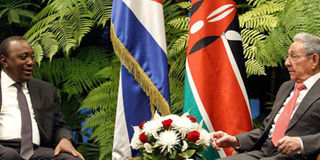Inside Cuba’s health system: A testimony

Cuban President Raul Castro (right) receives Kenya's President Uhuru Kenyatta at the Revolution Palace in Havana, on March 15, 2018. Cuba has a focus on prevention rather than waiting to cure the disease. PHOTO | ERNESTO MATRASCUSA | AFP
What you need to know:
- In Cuba, future doctors are involved in far more practical sessions, albeit under clinical supervision.
- I felt throughout the time I studied there that the teachers had the student’s best interests at heart. They were always available.
The first difference between Cuba’s health system and Kenya’s is the mode and duration of study.
In Kenya, depending on which of the medical schools you go to, you either end up in a five or six-year programme, do an exam, then your internship.
In Cuba the programme is five years, then you do your internship, after which there is a State exam.
Every province in Cuba has a medical school and to ensure everyone who graduates and adds the title “Dr” to their name is at the same level, we all had to do the same exam, a type of the Objective Structured Clinical Examination (OSCE).
MEDICAL EXPOSURE
So those of Kenyans who have graduated from Cuba have ended up doing three State exams: KCPE, KCSE and the Cuban Medical State Exam.
By the time one graduates from medical school in Cuba, he or she will have interacted with several patients.
In Kenya, the earliest you can apply your knowledge to a human being is after year three.
In Cuba, future doctors are involved in far more practical sessions, albeit under clinical supervision.
Because there are many hospitals in Cuba and a large number of consultants, every student gets to interact with a good number of patients and to observe their treatment by highly-qualified doctors before graduation.
EDUCATION
In Kenya, on the other hand, the teacher-student ratio is high. There are approximately 60 students to one lecturer.
In Cuba, the transition from the completion of your internship, passing your exam and graduation is seamless.
You immediately enrol into the masters programme in family medicine, after which you pursue your chosen field of specialisation.
This doesn’t mark the end, as there is continuous reading.
In Kenya, on the other hand, medical officers stagnate in their posts for years on end waiting to be released for school.
This has become worse with the devolution of healthcare to the counties.
Some counties are now blatantly refusing to release officers for further studies.
This is one of the reasons, I think, there is a deficit in the number of specialists.
SPECIALISTS
One other difference between the healthcare systems is the centralisation of consultants in Kenya as opposed to their decentralisation in Cuba.
Moving consultants from the big towns to where they are most needed, the sub-county hospitals will free up the referral hospitals to do what they do best — handling all the big and hard cases.
Cuba could also teach us a thing or two about innovation in healthcare.
They have invested a lot in immunisation and cancer treatment and is ahead of the pack.
Cuba is a pioneer in the use of scorpion venom in the management and treatment of cancer.
On March 2011, Cuba tested a solution extracted from the blue scorpion venom on more than 10,000 cancer patients, which yielded “positive results” ranging from “improved quality of life” to “slowing of tumour growth.”
RESEARCH
In terms of research, undergraduates in Cuba write papers of increasing complexity as they progress, adding to the body of medical knowledge.
Kenyans going to study in Cuba will find that even as they experience the expected culture shock, they will find a welcoming country with warm people and a lovely culture.
I felt throughout the time I studied there that the teachers had the student’s best interests at heart. They were always available.
They would take their time to guide you. You’d be assigned a mentor and he/she would be there for you for all your career.
On the other hand, in my practice here and in my interactions with my colleagues, a recurring theme has always been the unavailability of our bosses and this could be attributed to their numbers as they might not be enough to give the requisite cover.
TRAINING
The exposure to advanced medical practice and cutting-edge innovations for me was such an inspiration.
We can learn from Cuba by starting more medical schools and training more doctors and consultants.
We can also learn from them the different approaches they have towards cancer.
Cuba has a focus on prevention rather than waiting to cure the disease.
Cuba also has patents in place, albeit local ones, in terms of Vitiligo and cancer cures.
SERVICES
It has super specialists, which translates to the level of medicare in Cuba being exceptional.
They are so good that they are exporting doctors to countries all over the world.
They offer medical services to countries in need and also countries that have undergone calamities such as Haiti during the earthquake and Liberia during the Ebola crisis.
They also offer scholarships to all the countries in the world, which Kenyans looking to pursue medicine can benefit from.
Dr Richard Njooro Karanja, a surgical resident, graduated from the Latin American School of Medicine (ELAM) in CUBA in 2010. He is now pursuing Surgery at Moi Teaching and Referral Hospital in Eldoret.




